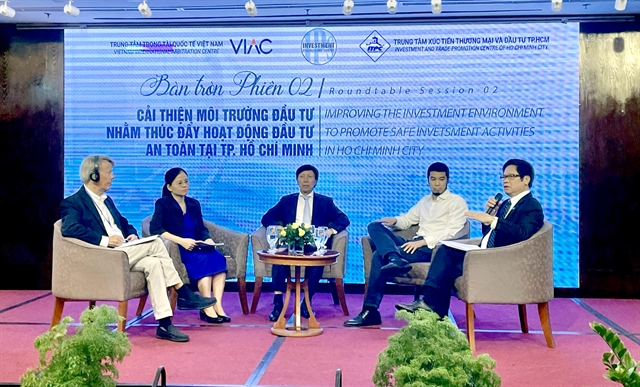Amid a new wave of investors arriving in Việt Nam to explore its opportunities for foreign businesses, HCM City has strong potential to attract investment and drive innovation and sustainable growth, experts said.

Amid a new wave of investors arriving in Viet Nam to explore its opportunities for foreign businesses, HCM City has strong potential to attract investment and drive innovation and sustainable growth, experts said.
HCM City is well-positioned to attract the lion’s share of the new wave of investors if it manages to mitigate a looming capacity shortage in terms of industrial land, office space, commercial real estate, and skilled labour, said Leif Schneider, vice chairman of Legal Sector Committee of the European Chamber of Commerce in Viet Nam.
HCM City continuously rakes in the highest figures of foreign investment, totaling US$3.74 billion last year, Schneider said at the Investment Support Forum and Review Conference of Investment Promotion Series held on Thursday in HCM City.
Three of the most important buzzwords for HCM City’s role in foreign direct investment (FDI) flows are digital, renewable and sustainable, he said.
One of the city’s greatest resources lies with its people. As foreign direct investment into HCM City gains sophistication, Viet Nam’s labour market will have to adapt to reflect the growing requirements in education and training.
Additionally, the city should continue its efforts to improve domestic infrastructure to support the absorption of increased trade and manufacturing activities.
Mary Tarnowka, executive director of the American Chamber of Commerce in Viet Nam, said, “Viet Nam is now one of the top destinations for FDI, both as companies seek to diversify their manufacturing supply chains and as they seek to target its own 100 million population and growing consumer class.”
“It is one of the fastest growing economies in the region, if not the world. It has a stable political environment, and a welcoming approach to FDI. It has a strategic location near source and consumer markets. It is integrated into a network of free trade agreements, from CPTPP and RCEP, the EVFTA and UKFTA, and now is part of the Indo-Pacific Economic Framework. And it has a young, relatively affordable tech-savvy workforce,” she said.
HCM City, a modern, dynamic city in the heart of Viet Nam’s Southern Key Economic Region, has all those advantages.
HCM City and the surrounding region is a top destination for multinational corporations seeking to diversify supply chains.
However, infrastructure gaps and lags in worker productivity could limit growth in Viet Nam generally and HCM City specifically.
The high cost of land in HCMC means a lot of manufacturing will move to nearby provinces, while HCM City needs to move up the value chain to focus on services, high-value manufacturing, and hopefully in the future, with the right regulatory environment and incentives, more international R&D centres.
HCM City needs the right urban planning and development policies to maintain its unique historic architecture and identity while facilitating its sustainable growth.
Tarnowka recommended that the investment climate be enhanced.
“The most important factor for a favourable investment climate is a fair, transparent, predictable, and streamlined regulatory environment that values innovation - not only to attract new investment, but also to maintain and grow investment already here,” she said.
"To ensure that HCM City’s manufacturing sector remains competitive and shifts to higher-value production, we encourage educational reforms, policies to promote supply chain localisation, investment in transportation and logistics infrastructure, actions to meet energy security and a clean energy transition, and increased incentives for high-tech investment and enhanced R&D capabilities," Tarnowka said.
Seck Yee Chung, vice president of the Singapore Business Group, said that continued dialogue with investors, and fair, transparent, predictable, and efficient regulatory systems would help improve the investment environment in HCM City.
Ensuring smooth investment licence renewal and investment expansion approval, the upgrade and construction of infrastructure, master plans on logistics and warehouses, and digital infrastructure that allows for continuous cross-border data transfer and cybersecurity are all needed to improve the investment environment, he said.
Cao Thi Phi Van, deputy director of the HCM City Investment and Trade Promotion Centre, said the city had many advantages to attract FDI flows, including a favourable geographic location, quality workforce and its leading position in manufacturing and high technology services.
She admitted that limitations in transportation infrastructure, logistics and workforce productivity needed to be addressed to improve the investment climate.
The city has attracted a total of 10,925 FDI projects worth US$78.3 billion from 115 countries and territories since 1988. — VNS





